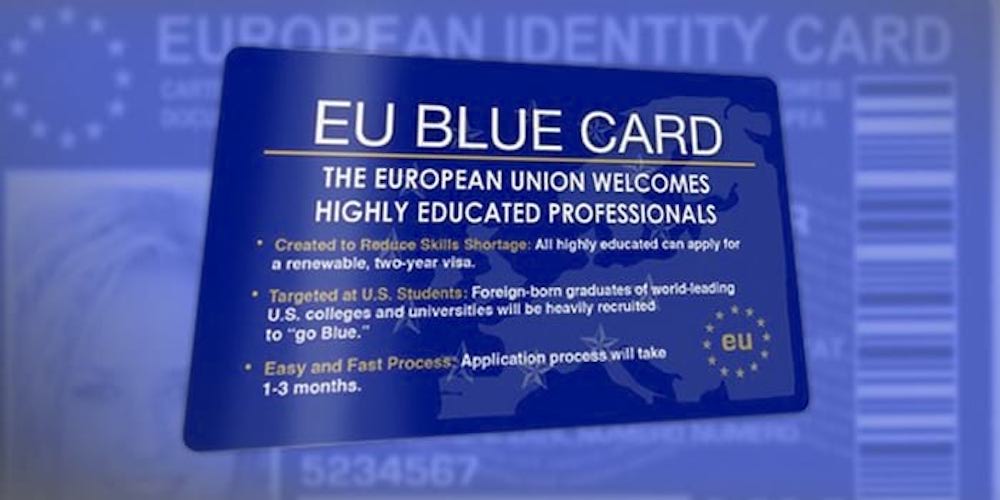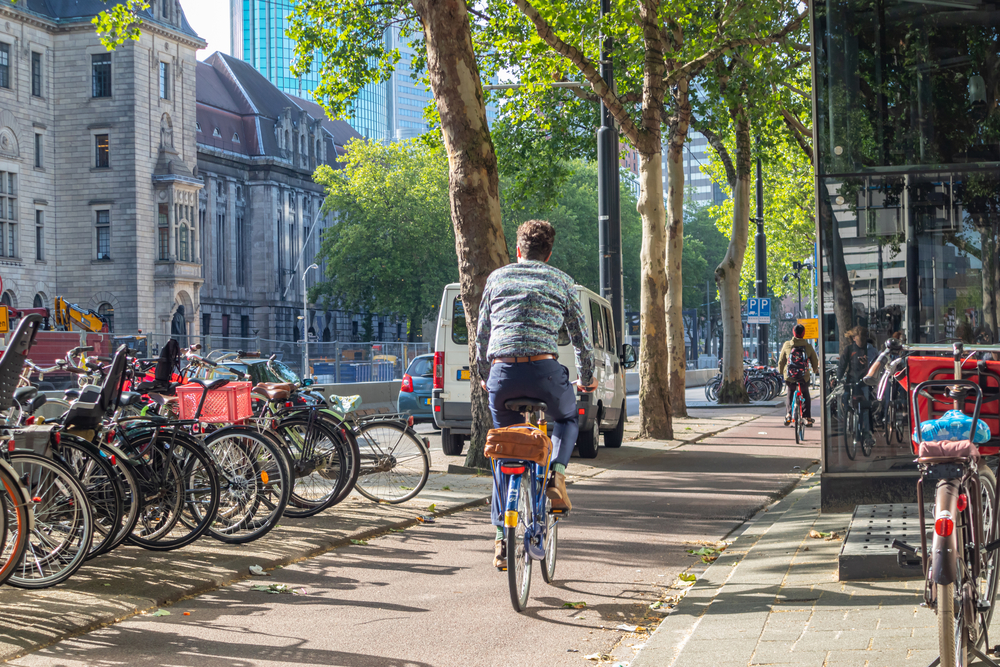What is the Blue Card and how to get it?
The Blue Card is a residence permit that allows highly skilled non-EU citizens to live and work in the European Union (EU). It was introduced in 2009 as a part of the EU's efforts to attract highly skilled workers to the EU member states.
The Blue Card allows its holders to work and live in the country of issuance and also to travel to other Schengen Area countries for up to 90 days within any 180-day period. The permit is valid for a maximum of four years and can be renewed if the holder continues to meet the eligibility requirements.
To obtain a Blue Card, a non-EU citizen must have a job offer in a highly skilled occupation that requires a university degree or equivalent. The salary offered for the position must be at least 1.5 times the average gross salary in the country where the job is located.
The applicant must also have a university degree or five years of professional experience in the field. Additionally, the applicant must have valid health insurance and not pose a threat to public order or national security.
Once an application for a Blue Card is approved, the holder may bring their immediate family members to live with them in the host country. Family members are defined as spouses, registered partners, and children under the age of 21.
It's important to note that each EU member state has its own regulations for granting the Blue Card, and the requirements and application process may differ from country to country.
The application process for the EU Blue Card varies slightly depending on the country in which you are applying for it. However, here are the general steps that you need to take to apply for the EU Blue Card:
Check if you are eligible: You must have a higher education degree or five years of professional experience, a valid work contract or job offer with a salary that meets the minimum wage requirement in the country where you will be working, and valid health insurance.
Find a job: You must find a job in a country that issues EU Blue Cards. The job must meet the minimum salary and employment conditions set by the country.
Gather the required documents: You will need to provide proof of your education and/or work experience, a valid work contract or job offer, and valid health insurance.
Apply for the EU Blue Card: You will need to submit your application and all required documents to the immigration authorities in the country where you will be working.
Wait for a decision: The immigration authorities will review your application and make a decision within a certain timeframe, depending on the country. If your application is approved, you will receive an EU Blue Card.
Renew your EU Blue Card: Your EU Blue Card will usually be valid for one to four years, depending on the country. You can renew it as long as you continue to meet the eligibility requirements.
Keep in mind that the application process and requirements may differ from country to country, so it is important to check the specific requirements for the country where you plan to apply for the EU Blue Card.
Here are some frequently asked questions about the EU Blue Card, along with brief answers:
What is the EU Blue Card? The EU Blue Card is a work and residence permit designed for highly skilled workers from non-European countries who want to live and work in the European Union.
Which countries offer the EU Blue Card? The EU Blue Card is valid in 25 of the 27 European Union member states (excluding Denmark and Ireland) as well as Iceland, Liechtenstein, Norway and Switzerland.
What are the eligibility criteria for the EU Blue Card? To be eligible for the EU Blue Card, you must have a university degree or equivalent qualification, a valid job offer in a highly skilled profession, and a salary that is at least one and a half times the average gross salary in the country you wish to work in.
How long is the EU Blue Card valid for? The EU Blue Card is initially issued for a period of one to four years, depending on the duration of your employment contract. After this period, it can be renewed for up to five years at a time.
Can I change jobs with an EU Blue Card? Yes, you can change jobs with an EU Blue Card, but you will need to apply for a new one if you change employers or move to a different EU country.
Can family members join me with an EU Blue Card? Yes, family members (spouses and dependent children) can join you with an EU Blue Card and are entitled to work and live in the same country as you.
Do I need a visa to apply for an EU Blue Card? If you are from a non-EU country, you will need a visa to enter the EU for the purpose of applying for an EU Blue Card. Once you have been issued an EU Blue Card, you will not need a separate visa to enter or leave the EU.
How long does it take to process an EU Blue Card application? The processing time for an EU Blue Card application varies depending on the country, but it can take several months.
How much does it cost to apply for an EU Blue Card? The application fee for an EU Blue Card varies depending on the country, but it is usually several hundred euros.
Can I apply for permanent residency with an EU Blue Card? Yes, if you have held an EU Blue Card for a certain period of time (usually two to five years), you may be eligible to apply for permanent residency in the country where you have been living and working.
Can I switch jobs with a Blue Card? Yes, you can switch jobs with a Blue Card. However, you must first obtain a new job offer that meets the requirements for the Blue Card in the new country.
Can I bring my family with me on a Blue Card? Yes, in most cases you can bring your family members with you on a Blue Card. The specific requirements for family members vary by country, but typically include spouses and children.
Can I apply for permanent residency with a Blue Card? Yes, in many countries you can apply for permanent residency after holding a Blue Card for a certain amount of time (usually two to five years). However, the specific requirements for permanent residency vary by country.
Can I apply for citizenship with a Blue Card? In some countries, holding a Blue Card may make you eligible to apply for citizenship after a certain amount of time. However, this varies by country and it is important to check the specific requirements.
Is the Blue Card recognized outside of the EU? No, the Blue Card is only recognized within the European Union. However, some non-EU countries have similar programs for highly skilled workers, such as the United States' H-1B visa.
How long does it take to get a Blue Card? The processing time for a Blue Card application varies by country, but it typically takes several months. In some countries, it may be possible to expedite the process for an additional fee.
Do I need to speak the local language to get a Blue Card? This varies by country and by job. Some countries require applicants to demonstrate proficiency in the local language, while others do not. In some industries, such as technology, English may be the dominant language.
How much does it cost to apply for a Blue Card? The application fee for a Blue Card varies by country, but it is typically several hundred euros. Additionally, there may be other costs associated with obtaining a Blue Card, such as translation and notarization fees.
Can I apply for a Blue Card while I am in the country as a tourist? No, you must apply for a Blue Card from outside the country, typically from your home country or a country where you have legal residence. However, some countries may allow you to apply for a Blue Card while you are in the country on a different type of visa, such as a student visa.
What happens if I lose my job while holding a Blue Card? If you lose your job while holding a Blue Card, you may have a limited amount of time to find a new job that meets the Blue Card requirements. If you are unable to find a new job, you may be required to leave the country. However, the specific rules and timelines vary by country.
There are certain groups of people who cannot apply for a Blue Card:
People who are not citizens of a non-EU country.
Those who do not have a job offer from an employer in an EU member state that has a Blue Card program.
People who have been in the EU for more than 90 days without a valid visa or residence permit.
Those who have a criminal record or have been deported from the EU in the past.
People who are not qualified enough for the job they are applying for or do not meet the education or experience requirements for the profession.

